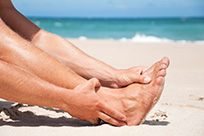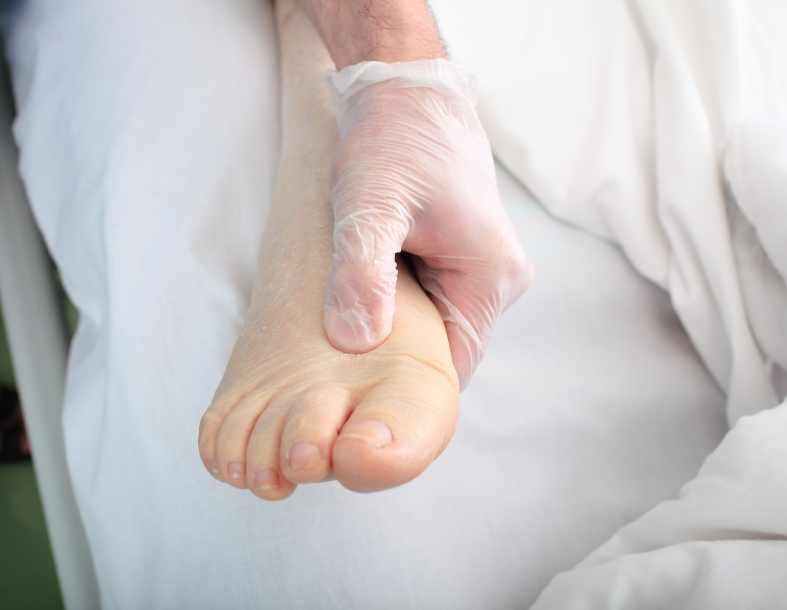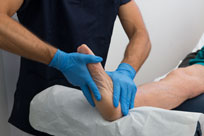Several Factors Can Predispose People to Gout Attacks
 There are many people who can vividly describe times/situations when they experienced instantaneous and excruciating pain in one of their feet without sustaining some type of injury or direct trauma. They cannot recall stubbing their foot/toe or dropping an object on their foot; they do, however, remember that the pain was at the base/joint of the big toe, and that the joint was tender, swollen, and hot to the touch.
There are many people who can vividly describe times/situations when they experienced instantaneous and excruciating pain in one of their feet without sustaining some type of injury or direct trauma. They cannot recall stubbing their foot/toe or dropping an object on their foot; they do, however, remember that the pain was at the base/joint of the big toe, and that the joint was tender, swollen, and hot to the touch.
In a majority of these cases, the people telling these stories are men, and the incidents are frequently described as ‘sudden attacks’ that happened while they were sleeping and to the extent where the mere pressure of the bedsheet made the pain unbearable; in medical terms, what they are describing is the condition known as gout.
Gout is a complex form of arthritis that is characterized by the symptoms of sudden and severe joint pain, habitually occurring at the base of the big toe, in tandem with redness and tenderness in the joint; it is typically caused by the over-accumulation of uric acid in the bloodstream. Uric acid is produced when the body breaks down certain types of foods; if too much uric acid is produced or if too little is excreted, the excess amount forms needle-like crystals that are deposited in the joint and consequently cause acute and severe pain and inflammation.
There are several factors that can predispose individuals to gout attacks; these include:
- Age – tends to occur more frequently after the age of 40 years
- Gender – males are more susceptible than females (until age 60)
- Heredity – family history/genetics can influence prevalence of gout
- Medication – diuretics (or water pills) can increase levels of uric acid
- Diet – particularly a high rate of consumption of red meat and seafood
- Alcohol Consumption – more than two liquor drinks or two beers per day
- Soda Consumption – notably a regular intake of fructose-sweetened drinks
- Health Conditions – obesity, heart/kidney disease, hypertension, or diabetes
While some of these factors are non-controllable i.e. age, gender, heredity, individuals wishing to prevent gout attacks or reduce their frequency can take action with respect to their diet. This entails the elimination or limiting of foods that are high in purines, which are the substances in foods that the body converts into uric acid; some purine-rich foods that should be avoided or consumed in moderation only include:
- Red meats
- Fatty poultry; high-fat dairy
- Liver, kidney, and sweetbreads
- Trout, mackerel, haddock, and tuna
- Anchovies, sardines, mussels, scallops
Conversely, there are some high-purine foods that have been shown to not increase the risk or recurrence of gout; this group includes vegetables such as cauliflower, asparagus, spinach, peas, and mushrooms, as well as beans and lentils.
Choice of Footwear Can Alleviate or Aggravate Gout Pain
 Although there is no specific cure for gout, this condition can be treated and controlled with remedies that include lifestyle/dietary changes, as well as prescription medications; the medical treatment for gout consists of anti-inflammatory drugs such as:
Although there is no specific cure for gout, this condition can be treated and controlled with remedies that include lifestyle/dietary changes, as well as prescription medications; the medical treatment for gout consists of anti-inflammatory drugs such as:
- Non-steroidals – pills to reduce acute pain and inflammation within hours
- Corticosteroids – pill or injection for those who cannot take non-steroidals
- Colchicine – long-term, low-dose treatment to the reduce risk of recurrence
Furthermore, footwear worn by gout sufferers must be carefully selected in order to help alleviate the pain that these individuals can experience from their condition. While some forms of footwear may look or seem to be more comfortable, they can in fact aggravate the pain; these include:
- Slippers
- Sandals
- Flip-flops
- Moccasins
On the other hand, good footwear choices for gout sufferers consist of the following:
- Oxfords
- Walking shoes
- Athletic sneakers
The foot care professionals at Comfort Stride Foot Care Clinic can be valuable resources with respect to footwear recommendations for individuals with a history or predisposition to gout attacks. Consultation with these specialists can determine whether one’s current choice of footwear is appropriate or if any changes in footwear should be considered.
To learn more about the foot care services available from the experienced professionals at Comfort Stride Foot Care Clinic, please visit our Services Page or Call the clinic today at 647-989-7794 to request additional information.





